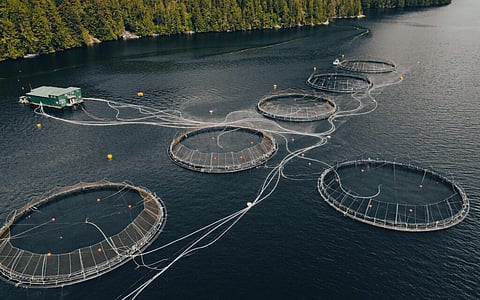

Kitasoo Xai'xais Nation holds six salmon farm tenures currently leased and operated by Mowi Canada West providing over 20 full-time, year-round jobs for community members.
Photo: Kitasoo Xai'xais Nation / Kitasoo Seafoods.
"We are certain that failure to renew current salmon farming licences will put our Nation at risk." This is how blunt Isaiah Robinson, Kitasoo Xai'xais Nation Deputy Chief Councillor, is in the letter he sent last week to Canada's Prime Minister Justin Trudeau. In addition to calling for the urgent renewal of salmon farming licenses in British Columbia, the letter also urged him to support the Kitasoo Xai'xais Innovation Plan.
First, it was the Canadian aquaculture industry, then, the supply and support companies. The one forwarded by Robinson is the third letter urging Trudeau to immediately renew BC aquaculture licenses since we learned that proposed revisions to Canada's marine finfish aquaculture regulations may include longer licence durations and stricter sea lice rules.
"I am writing to you on an urgent basis as your government is nearing final decisions on the renewal of salmon farming licences in British Columbia and the publication of a transition plan that will significantly impact the future well-being of our Nation and our People," Robinson says on behalf of the Kitasoo Xai’xais Nation. Current marine finfish aquaculture licences in British Columbia are due to expire on June 30, 2024.
Like the other stakeholders who previously addressed the Government of Canada on this issue, in his letter Robinson also emphasizes the uncertainty and concern that the new Department of Fisheries and Oceans (DFO) policy - which outlines a goal to reduce interactions between wild and farmed salmon by transitioning the industry away from open-net pen fish farms - is causing in the communities dependent on this industry.
As mentioned above, in the letter sent to the Prime Minister, the Deputy Chief Councillor of the Kitasoo Xai'xais Nation claims they are sure that the non-renewal of the current salmon farming licenses will put their Nation at risk, but adds more data.
It will mean -he explains- annual economic losses approximated at CAD 2.82 million (EUR 1.90 million / USD 2.06 million) in economic output, CAD 2.8 million (EUR 1.88 million / USD 2.04 million) in employment income, and 60 jobs within their Nation.
Isaiah Robinson therefore calls on the Government of Canada to act urgently. "With respect to our Rights and Title authority to decide the future of salmon farming in our traditional territory, we are asking that you renew all salmon farming licences in British Columbia for a minimum of six years," he writes.
Previously, he recalls the Kitasoo Xai'xais have continually asserted their Rights and Title in their traditional territory and have invited DFO to participate in collaborative efforts to gain input on their visionary approach to industry management.
"At times, this dialogue with the DFO and the Government of Canada has been frustrating and onesided," he complains. "Today, we are no closer to understanding the federal government's direction in finalizing a 'responsible transition plan'."
Regarding these collaborative efforts, Robinson also recalls the Government that they have developed their own initiatives to ensure innovative practices and progressive development within their aquaculture industry. There are two, the Kitasoo Model and the Kitasoo Xai'xais Finfish Aquaculture Innovation Plan.
Over the past three decades, the Kitasoo Model has been instrumental in fostering a robust and sustainable economy. Based on co-governance and cultural values, this "pioneering framework for sustainable finfish aquaculture" integrates natural resource management with community-led economic development.
Moreover, it also ensures environmental health and economic vitality through innovative and adaptive management practices, which, according to the letter, is the foundation for that long-awaited collaboration.
The Innovation Plan, on the other hand, is intended to expand and modernize the Kitasoo Model framework. Developed after more than 20 years of scientific research and centuries of traditional knowledge, it represents the Kitasoo Nation's commitment to sustainability and community well-being. Improving technology adoption and innovation in the local industry, establishing the KX Aquaculture Management Committee for environmental oversight, and developing metrics that reflect its goals and public concerns, are their objectives.
"The Innovation Plan not only addresses political and public concerns regarding the salmon farming industry but also sets a foundation for a sustainable and prosperous future in finfish aquaculture, reinforcing our ability to balance environmental stewardship, economic development, and community resilience," Isaiah Robinson explains.
With only one month to go before the license renewal deadline, the Kitasoo Xai'xais Nation and the entire BC salmon industry are waiting for a response.
